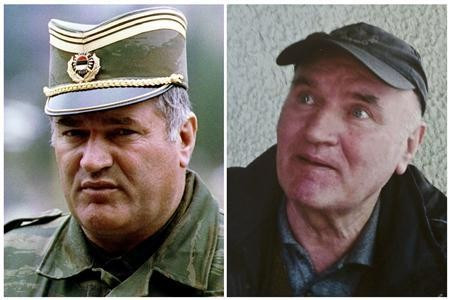Ratko Mladic, Serbia's Fugitive General

Early in the morning of 26 May 2011, a force from Serbia's Security and Information Agency (BIA) captured and arrested Bosnian Serb military commander Ratko Mladic in the village of Lazarevo, about 50 miles north of Belgrade, the Serbian capital, to where he was promptly removed.
In Belgrade, extradition proceedings for his transfer to the International Criminal Tribunal for the former Yugoslavia (ICTY) in The Hague, were already under way. General Mladic faces likely charges of genocide, crimes against humanity and other war crimes relating to the siege of Sarajevo. Probably the most serious and notorious of the charges will centre on the attack on the UN-declared safe area of Srebrenica in July 1995 and the subsequent massacre there of Bosnian Muslim men.
The siege of Sarajevo, the capital of Bosnia, is one of the longest in modern warfare. When the siege started on 05 April 1992, the city proper had an estimated population of 435,000. Ending on 29 February 1996, as many as 10,000 of its citizens had been killed and 56,000 wounded. Today, the city's population is an estimated 310,000.
At Srebrenica, men and youths of fighting age were separated from the women and children and led away to be massacred. The death toll from this atrocity is estimated between 7,000 and 8,500. Ratko Mladic denies responsibility for ordering these deaths, a difficult argument to make when one is Colonel General of the Yugoslav People's Army (JNA).
On 26 May 2011 at a press conference in Belgrade, President Boris Tadic said: "Mladic's arrest has closed a difficult period of history. We have removed the tarnish from Serbia, all of its citizens and the Serb people wherever they may live."
Has Serbia known anything other than difficult periods of history!?
The former General had been living in the home of a cousin and using the name, Milorad Komadic but when pinned to the floor by his masked assailants he identified himself correctly and made no resistance.
Apparently, the BIA had been keeping him under surveillance for two months in the mostly ethnic-Serb village of 3,300 making the claims by some of his neighbours that they had no idea of his identity or whereabouts, a little hard to believe.
Others in the village expressed regret at the capture of a man they identify as a Serb hero and if the majority accepted a fait accompli, there's no celebration and much resentment, a mood generally reflected in the country as a whole. Rough polls taken since Mladic's capture show that a small majority regard him as "hero" and most Serbs do not approve of him being sent to the The Hague - if he is to be tried, then let it be in Belgrade - an opinion now overtaken by events.
Older people in particular are most unhappy. The Daily Telegraph's reporter Nick Squires on 28 May 2011 quotes a Momcilo Zivkovic, 55, saying: "He is our hero, the best Serbian general, a man who enshrines all the best characteristics of the Serbian people..."
The article goes on to say that he has been offered as a "sacrifice" by the Serb government in the hope of reviving the country's accession to the EU, though another reason must be the embarrassment of the 16 years Mladic spent supposedly "on the run". More and more articles appear stating that he lived a relatively normal life in Belgrade under the protection of Slobodan Milosevic. Only after Milosevic's arrest in 2001, did he have to become more discreet and it seems likely that others in government and the security services protected him until 2008.
Mr Zivkovic represents the ultra-Serb viewpoint much less typical today, whilst the Government, having time enough before elections are due, want Mladic out of the way. Oliver Cromwell is reported to have said that the execution of Charles I was a "necessary evil" and despite the condemnatory words of the events during the Bosnian War, the decision to arrest General Mladic is also a pragmatic one. The Netherlands in particular, for theirs was the UN force guarding Srebrenica, would not allow any talks on EU membership to proceed until the former General was brought to The Hague to face trial
To many outside Serbia, the conclusion must be that the Government and Security forces in Serbia have known of Mladic's whereabouts all along and were simply stalling on handing over the possible war criminal/patriot. Sitting comfortably in a western democracy, it is easy to condemn such inaction but Serbia is no comfortable democracy and the Government - even the very pro-Western, EU candidate, coalition in power at present - must judge when it is safest to take such a controversial undertaking.
Many Serbs see their country and people - which includes those Serbs in the immediately surrounding states - as victims. Victims of conquest by greater powers; terrible losses in wars to defend their territory; ethnic cleansing perpetrated by an at-the-time, great power invader with the active support of its near neighbour; and the apparent indifference to the country's sufferings by those it had considered allies.
On 28 June 1989, Slobodan Milosevic, in a speech to mark the 600th anniversary of the Battle of Kosovo praised how Serbia had defended Europe, its culture, society and religion and referring to more recent times, described Serbia as: "...this beautiful country, this unjustly suffering country..."
Ratko Mladic was born in 1942, his father was a partisan fighter against the Nazis and their Croat allies - the puppet state of Hrvatska (NDH). The Croats "ethnically cleansed" between 330,000 and 390,000 Serbs in the Croatian designated area in a deliberate policy of genocide during World War II. Total Serb casualties numbered about 530,000. Being surrounded by fear and death on such an industrial scale could not have been the best of home environments for a young Mr Mladic.
The former Bosnian Serb army chief was flown to the Netherlands shortly after a Serbian court rejected his appeal against extradition on 31 May 2011. The extradition papers were signed by Serbian Justice Minister, Snezana Malovic. Let's hope the sacrifice secures Serbia a brighter future.
© Copyright IBTimes 2025. All rights reserved.




















